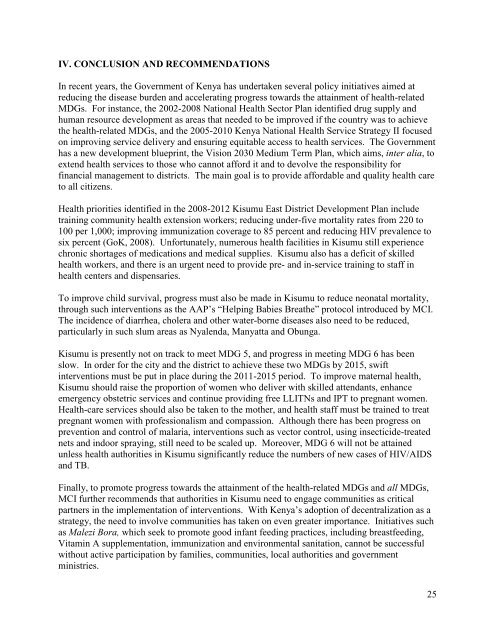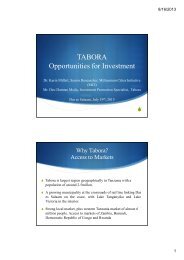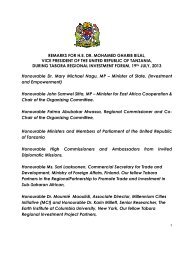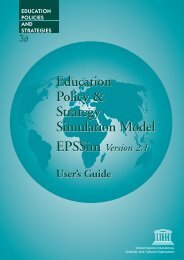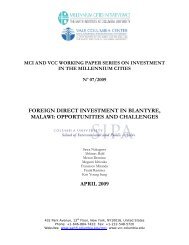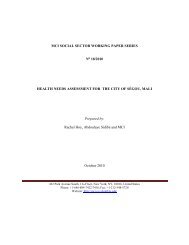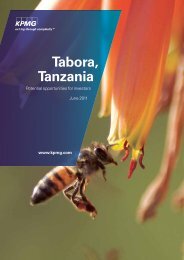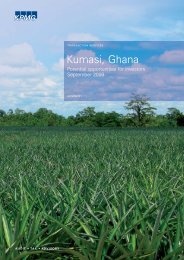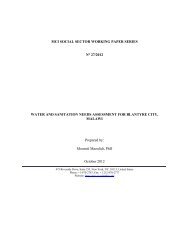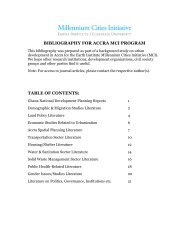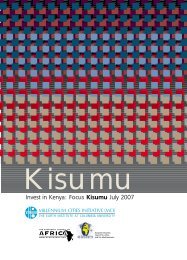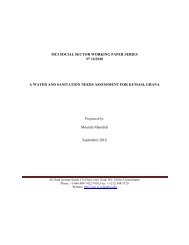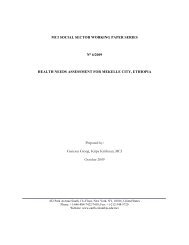Health Needs Assessment for Kisumu, Kenya - Millennium Cities ...
Health Needs Assessment for Kisumu, Kenya - Millennium Cities ...
Health Needs Assessment for Kisumu, Kenya - Millennium Cities ...
You also want an ePaper? Increase the reach of your titles
YUMPU automatically turns print PDFs into web optimized ePapers that Google loves.
IV. CONCLUSION AND RECOMMENDATIONS<br />
In recent years, the Government of <strong>Kenya</strong> has undertaken several policy initiatives aimed at<br />
reducing the disease burden and accelerating progress towards the attainment of health-related<br />
MDGs. For instance, the 2002-2008 National <strong>Health</strong> Sector Plan identified drug supply and<br />
human resource development as areas that needed to be improved if the country was to achieve<br />
the health-related MDGs, and the 2005-2010 <strong>Kenya</strong> National <strong>Health</strong> Service Strategy II focused<br />
on improving service delivery and ensuring equitable access to health services. The Government<br />
has a new development blueprint, the Vision 2030 Medium Term Plan, which aims, inter alia, to<br />
extend health services to those who cannot af<strong>for</strong>d it and to devolve the responsibility <strong>for</strong><br />
financial management to districts. The main goal is to provide af<strong>for</strong>dable and quality health care<br />
to all citizens.<br />
<strong>Health</strong> priorities identified in the 2008-2012 <strong>Kisumu</strong> East District Development Plan include<br />
training community health extension workers; reducing under-five mortality rates from 220 to<br />
100 per 1,000; improving immunization coverage to 85 percent and reducing HIV prevalence to<br />
six percent (GoK, 2008). Un<strong>for</strong>tunately, numerous health facilities in <strong>Kisumu</strong> still experience<br />
chronic shortages of medications and medical supplies. <strong>Kisumu</strong> also has a deficit of skilled<br />
health workers, and there is an urgent need to provide pre- and in-service training to staff in<br />
health centers and dispensaries.<br />
To improve child survival, progress must also be made in <strong>Kisumu</strong> to reduce neonatal mortality,<br />
through such interventions as the AAP’s “Helping Babies Breathe” protocol introduced by MCI.<br />
The incidence of diarrhea, cholera and other water-borne diseases also need to be reduced,<br />
particularly in such slum areas as Nyalenda, Manyatta and Obunga.<br />
<strong>Kisumu</strong> is presently not on track to meet MDG 5, and progress in meeting MDG 6 has been<br />
slow. In order <strong>for</strong> the city and the district to achieve these two MDGs by 2015, swift<br />
interventions must be put in place during the 2011-2015 period. To improve maternal health,<br />
<strong>Kisumu</strong> should raise the proportion of women who deliver with skilled attendants, enhance<br />
emergency obstetric services and continue providing free LLITNs and IPT to pregnant women.<br />
<strong>Health</strong>-care services should also be taken to the mother, and health staff must be trained to treat<br />
pregnant women with professionalism and compassion. Although there has been progress on<br />
prevention and control of malaria, interventions such as vector control, using insecticide-treated<br />
nets and indoor spraying, still need to be scaled up. Moreover, MDG 6 will not be attained<br />
unless health authorities in <strong>Kisumu</strong> significantly reduce the numbers of new cases of HIV/AIDS<br />
and TB.<br />
Finally, to promote progress towards the attainment of the health-related MDGs and all MDGs,<br />
MCI further recommends that authorities in <strong>Kisumu</strong> need to engage communities as critical<br />
partners in the implementation of interventions. With <strong>Kenya</strong>’s adoption of decentralization as a<br />
strategy, the need to involve communities has taken on even greater importance. Initiatives such<br />
as Malezi Bora, which seek to promote good infant feeding practices, including breastfeeding,<br />
Vitamin A supplementation, immunization and environmental sanitation, cannot be successful<br />
without active participation by families, communities, local authorities and government<br />
ministries.<br />
25


